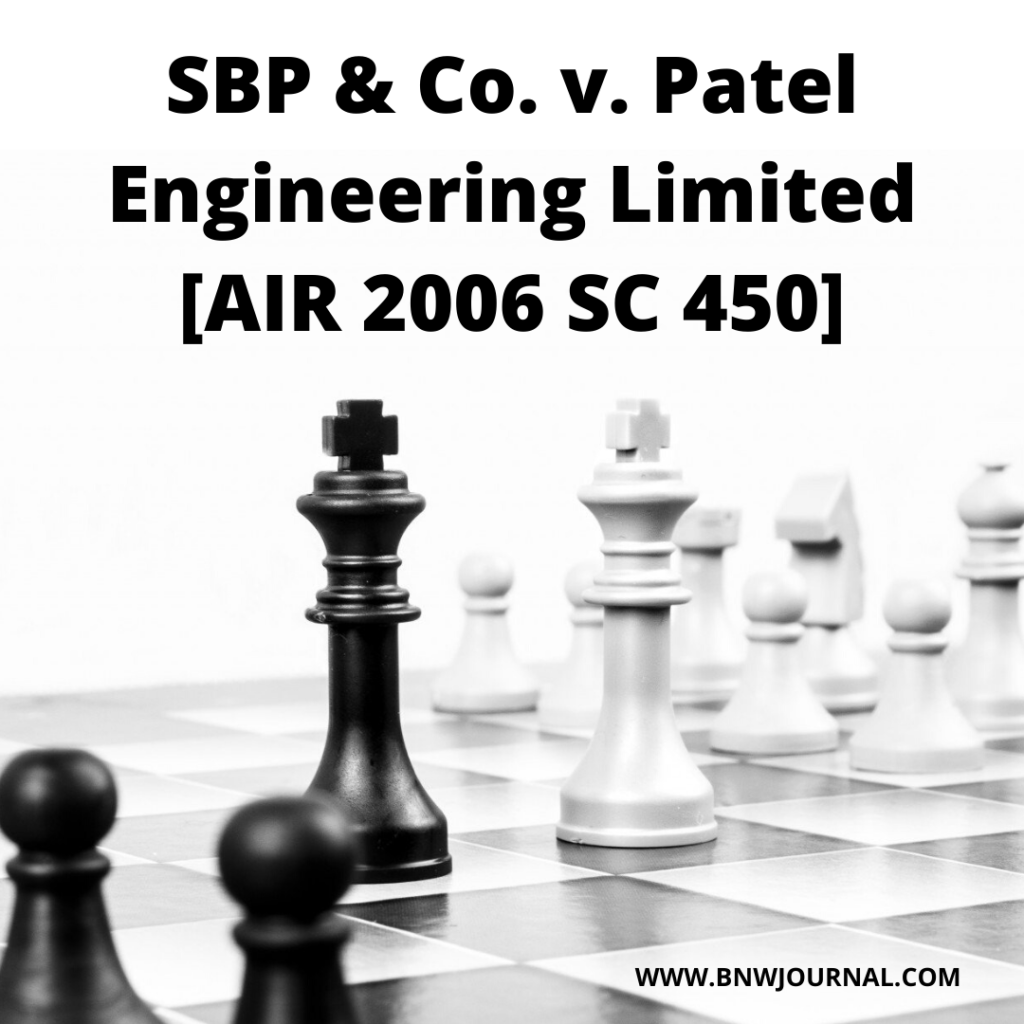![]()
INTRODUCTION
In SBP & Co. v. Patel Engineering Limited, the Supreme Court has clarified and explained the operation of Section 11(6) of the Arbitration and Conciliation Act, 1996 (for short – “the Act”), which deals with the appointment of arbitrators by the Chief Justice. The Court explained that such an appointment is an exercise of judicial power.

Various commentators have criticized the decision made in this case. As according to them, it goes beyond the role of a judicial forum. In a matter relate to party chose dispute resolution forum.
The article analysis the case in detail and also discuss the aftermath of this case.
FACTS OF THE CASE
- In March 1992, the Government of Maharashtra award a contract to the respondent. It is for executing work relate to Koyna Hydroelectric Project. For this purpose, the parties entered into two contracts: sub-contract agreement and piece-work agreement. Both the agreements contained identical clauses for resolving disputes and differences between the parties, by arbitration.
- For the sake of the convenience, Clause 19 of the piece-work is produced below:
“19. During the continuance of this piece-work agreement/contract or at any time after the termination. Thereof, if any difference or dispute shall arise between the parties hereto in regard to the interpretation of any of the provisions. Herein contain or act or thing in relation to this agreement/contract. Such difference or dispute shall be forthwith refer to two arbitrators for arbitration in Bombay. One to be appoint by each party with liberty to the arbitrators. In case of differences or their failure to reach an agreement within one month of the appointment. It is to appoint an umpire residing in Bombay and the award. Which shall be made by two arbitrators or umpire as the case may be shall be final. Conclusive and binding on the parties hereto.
If either party to the difference or dispute shall fail to appoint an arbitrator within 30 calendar days; after notice in writing having been given by the parties. Shall appoint an arbitrator who shall refuse to act then the arbitrator appoint by the other party shall be entitle to proceed with the reference as a sole arbitrator. And to make the final decision on such difference or dispute and the award made. As a result of such arbitration shall be a condition precedent to any right of action against any; two parties hereto in respect of any such difference and dispute.”
- In October 1996, some disputes and differences arose between both the parties to a contract. The panel of three arbitrators were appoint by the parties. They pass unanimous awards on February 2000, by stating State Government to pay compensation to respondent. At first, the State Government challenged the above awards. But later on, withdrew it, and pay the amount to the respondent.
- In July 2001, the appellants with the help of their power-of-attorney holder; served a notice to Respondent 1 requiring them to pay the due amount. But the latter didn’t comply with their demand. After three months, the appellants invoke the arbitration clauses, enshrined in both the agreements, i.e., sub-contract agreement and piece-work agreement and issued a letter on 3-10-2001, by appointing an arbitrator on their behalf.
- In its response, Respondent 1 denied the claim and they also appointed an arbitrator on its behalf. However, later on, he refused to act as an arbitrator, via letter, stating that he remained associated with Koyna Project as Superintending Engineer and Chief Engineer. Later on, Respondent 1 sent a letter to another person, Shri S.L Jain, with the request to act as an arbitrator on its behalf, and received a letter by him consenting for the same. On the same date, he communicate this fact to Respondent 2 that in terms of Section 15(2) of the Act, they’re entitle to appoint a substitute arbitrator and latter has consente for the same. On 7-3-2002, the power-of-attorney holder of appellants informe the respondent that appointing replacement arbitrator is contrary to the terms of sub-contract agreement and piece-work agreement.
- Meanwhile, the power-of-attorney holder of appellants sent a letter to Respondent 2 and the first arbitrator, Shri S.N. Huddar (who refused), requesting them to appoint the third arbitrator. On his part, the Respondent 2 sent a letter, informing the parties that in view of Shri Huddar’s refusal to act as an arbitrator. He becomes a sole arbitrator and he asked them to appear at Mumbai for a meeting.
- After appointment as an arbitrator on behalf of the Respondent 1, S.L. Jain sent a letter to Respondent 2, suggesting three names of retired Bombay High Court Judges for appointment as presiding arbitrator. In his reply, Respondent 2 claim that Section 15(2) of the Act doesn’t apply here and as per Clause 18 of the subcontract agreement and Clause 19 of the piece-work agreement, he is entitle to act as a sole arbitrator.
- At that stage, Respondent 1 filed an Arbitration Applications under Section 11 of the Act, for the appointment of the third arbitrator. The Designated Judge of the Bombay High Court allowed applications and appointed Shri Justice M.N. Chandurkar (Retd.) as a third arbitrator.
ISSUES
Whether the order passed by the learned Designated Judge of the Bombay High Court to appoint Shri Justice M.N. Chandurkar (Retd.) as a third arbitrator, under Section 11(6) of the Act is legally correct?
ANALYSIS
The learned Senior Counsel appearing on behalf of appellants argue that the arbitration clauses contain in both the agreements are binding on both the parties. In the issue of S.N. Huddar’s refusal, to act as an arbitrator on behalf of Respondent 1, Respondent 2 became the sole arbitrator, and as such the learned Designated Judge didn’t have the power or authority to appoint the third arbitrator.
The learned Senior Counsel, on behalf of the appellant emphasize that there was no provision in the agreements, with regard to the appointment of a substitute arbitrator. Therefore, the appointment of S.L. Jain, as a substitute arbitrator was not legally permissible.
Learned Senior Counsel further argued that Section 15(2) of the Act can be invoked for the appointment of a substitute arbitrator, but only when the mandate of an arbitrator gets terminated on the account of his withdrawal from the office or according to the agreement between the contracting parties. But not in such cases, where the arbitrator appointed by the parties, refused to act as such, or any other cases: to terminate the agreement which doesn’t contain provisions related to the appointment of a substitute arbitrator.
In support of his arguments, the learned Senior Counsel relied on the judgments given by the Court in ACE Pipeline Contracts (P) Ltd. v. Bharat Petroleum Corpn. Ltd. 2007 5 SCC 304, Northern Railway Admn. Ministry of Railway v. Patel Engg. Co. Ltd. 2008 10 SCC 240 and Union of India v. Singh Builders Syndicate 2009 4 SCC 523.
Respondent’s argument
The learned Senior Counsel on behalf of Respondent 1, directed our attention towards the letter written by S.N. Huddar, on January 2002, expressing his inability to become an arbitrator, on behalf of Respondent 1 and argued that his client hasn’t committed any illegality by appointing S.L. Jain, as a substitute arbitrator.
He submitted that an appointment of an arbitrator only becomes effective, when a person consents to be the same. In case a person refuses to be an arbitrator, then the party appointing such a person has the freedom to appoint another arbitrator, even if there is no express agreement between the parties. In support of his argument, he relied upon the judgment of this Court in Yashwith Constructions (P) Ltd. v. Simplex Concrete Piles India Ltd. 2006 6 SCC 204.
He further argued that on a plain reading of Section 15 of the Act, Respondent 1 has right to appoint a substitute arbitrator, whereas Respondent 2 can’t act as a sole arbitrator merely on the ground that S.N. Huddar, who was originally appointed as an arbitrator, refused to become the same, on behalf of Respondent 1.
He submitted that the learned Designated Judge of the High Court didn’t commit any sort of error by appointing the third arbitrator, in order to resolve the dispute, because Respondent 2 didn’t agree to the suggestion of S.L. Jain, of appointing the third arbitrator from the panel of three retired Judges of the High Court.
JUDGMENT
In the light of the appeals arose, the appellants had challenged the order passed by Division Bench of the Bombay High Court whereby it held that the writ petitions filed against the orders passed by the learned Designated Judge of that Court, for the appointment of Shri Justice M.N. Chandurkar (Retd.), as a third arbitrator for resolving the disputes between the appellants and respondent are not maintainable.
For this decision, the Division Bench relied upon the judgments made by this Court in Konkan Railway Corpn. Ltd. v. Mehul Construction Co. [2000 7 SCC 201], which was also approved by a Constitution Bench in Konkan Railway Corpn. Ltd. v. Rani Construction (P) Ltd. [2002 2 SCC 388].
The majority’s judgment in Rani Construction (P) Ltd. case was that the power exercised by the Chief Justice or any person or institution designated by him under Section 11(6) of the Act, is administrative power and measures taken under that section are not subject to be challenged by the aggrieved party, by resorting to intermediary proceedings.
This judgment of the Constitution Bench was overruled by the Seven-Judge Bench in SBP & Co. v. Patel Engineering Ltd., where it was held that the power exercised by the Chief Justice of the High Court or the Chief Justice of India under Section 11(6) of the Act, is judicial, not an administrative power and further: an order passed by the Chief Justice of the High Court or by the Designated Judge of that Court can be challenged only under Article 136 of the Constitution of India.
CONCLUSION
At last, we can sum up our conclusion:
- The power exercised by the Chief Justice of the High Court or by the Chief Justice of India under Section 11(6) of the Act, is judicial, not administrative.
- The power under Section 11(6) of the Act, could be delegated by the Chief Justice of the High Court to another Judge of that High Court and by the Chief Justice of India to another Judge of the Supreme Court.
- In case of the designation of a Judge of the High Court or of the Supreme Court, the power exercised by the Designated Judge will be as of Chief Justice, as per the powers conferred by the statute.



0 Comments